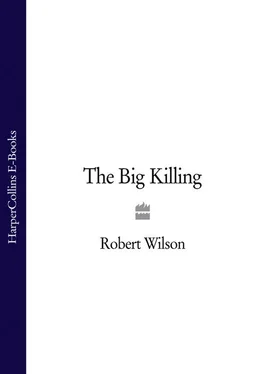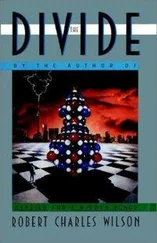‘I’m confused,’ he said after some moments. ‘I thought you were on holiday and had a couple of jobs.’
‘I am. I do. But no money.’
Martin said he’d have the expense account open in five minutes. We guffed around a bit more, I asked about Anne, and we hung up.
The door from the passageway opened, the handle hitting the wall hard, and the robed-up African moved through the lobby on the end of a typhoon. The girl came down the passageway doing up her wrap and looking frightened. The madame had come off her elbows on the end of the desk and was standing with her fists balled into where her waist probably was. She said something in her own language which woke the older prostitute, who recognized the tone. The three of them set to it.
I phoned the Novotel from the middle of the cat fight and booked a car for that afternoon. Then I realized what all the broken furniture was about. The madame reached into the pile and brought out a piece of board and gave the girl three hefty whacks on the bottom before I dropped the phone and took the board out of her hand. She turned on me with something in her eyes which I would have preferred to have been murder and I threatened her with the board.
‘You pay for girl!’ she shouted in French.
‘I don’t want the girl.’
‘He want the girl’ – she pointed out of the door – ‘but he drink too much, he see the goods, he try but he no pay. You pay.’
‘Why hit the girl?’
She blinked a few times at that because she wasn’t sure why she was hitting the girl. ‘You want to go hit him for me?’
I left money on the counter, which she rushed at, and got out of there leaving the madame pelting the older prostitute with drawbacks of the trade while the girl dropped on her haunches in the corner and cried.
It was 2.30 p.m. by the time I joined the Grand Bassam/Abidjan highway and drove past the handicraft shops, who could sell you a pot for more than you’d pay in Sèvres, and traditional healers, who could put a spell on a troublesome mother-in-law in Tashkent. It was a pleasant drive along the palm-treed coastline, past a seamless bidonville of stalls selling tat, bars, and hotels specializing in rooms by the hour. I skirted the end of the airport runway and high up above the departures hall was a team of vultures, their fingers spread at the end of their wings, circling in the thermals, grumbling at the low incidence of pilot error since computers came in.
After the airport the two-lane Grand Bassam road joined a fourteen-lane highway into downtown Abidjan. I drove through the suburbs of Koumassi and Marcory with the Manhattan-style skyline of the financial district called Plateau in front of me. You could forget you were in Africa if you concentrated on the skyscrapers but at Treichville I broke right and the buzz and hot stink of life in the African Abidjan brought me home. I crossed the lagoon, that separated the two continents, over the Pont Général de Gaulle.
Life hadn’t been so good in Abidjan recently. Before it was no different to being in any modern city; built around the lagoon the cityscape looked like Sydney and the facilities were much the same. Everything had been accessible on a well-larded expatriate salary and after work the residential districts of Cocody and Deux Plateaux were splashed with gold and silver lame and rang with crystal laughter. On the other side of those well-clipped hedges the locals were beginning to hit the ground with sticks while they listened to the President’s fading charisma. Then the power workers went on strike. Now there was no guarantee of getting ice in a whisky and cool air to sleep in.
The Ivorians, like all the people along this coast, wanted to run their own country with a bit of democracy. Now that the money had run out, the price of coffee and cocoa had dropped and the value of pineapples foundered, people had taken to thinking they could do no worse than have a crack at it themselves. The army had sensed a mood and had staged a rebellion and the air force had followed. In the confusion a lot of shops were emptied by people with no credit facilities but strong arms and big appetites.
Order was re-established after a few pay rises were promised but not with the same respect for the law as before. Care had to be taken on the streets. There were a lot of fast young men who weren’t above a little violence to get a handbag or a gold chain. People ran from their cars to the office and didn’t bother to go out for a meal or try to see a film which might not make it to the last reel. Restaurants closed, businesses folded. Everybody stayed in and sweated by candlelight and drank very warm Beaujolais and thought about Geneva and other places of perfect order.
I parked my car in the Novotel basement, picked up the hired Peugeot that blended in with all the other Peugeots that were the only cars in Ivory Coast unless you had a ministerial Mercedes or a bandit’s BMW. I worked my way north up to the Banco National Park passing the fanicos, a bunch of immigrant workers who stood in thigh-deep water all day washing clothes by pounding them against rocks in the river, and headed west towards the coastal town of Grand Lahou. They were few cars out in the susurrating heat, which meant that I didn’t have to eat someone else’s dust, picking grit out of my eyes on the graded road.
The drop point was in a pineapple plantation. Tracks had been cut through the fields for harvesting and one of these led down to a landing stage on the Ebrié lagoon, the body of water which stretched west from Abidjan about sixty miles. I decided to take Fat Paul’s advice and check it out beforehand and then drink beer in Tiegba until time came for the drop at 8.30.
I found a left turn with the orange arrow that George had told me about and took the dirt track between the acres of tilled grey earth with a foot-high pineapple every metre whichever way you looked. Three kilometres later the track dropped down steeply through thick vegetation to a large clearing of beaten and sunbaked earth from which a wooden jetty took off out into the lagoon.
It was no cooler down by the water. There was no fresh breeze coming off it, just more humidity and insects. Out on the jetty, down between the warped and loosening slats of the walkway, the water had hardly the energy to slop around the wooden support struts. Through the haze I could just see the opposite bank of the lagoon. The sun, still high even though there was only another hour and a half’s light in it, punished the scene and the sweat dripped off my eyebrows. I turned back and something flashed in the corner of my eye from high up in the vegetation on the bank. I ambled back towards the car, casting about like a retired colonel with no troops to inspect, and a fish came up for a fly, leaving concentric ripples. Another flash – high up to my right and I got a fix on it this time.
Looking back from the jetty I could see another track dropped down at the far end of the clearing from where I’d parked. I stepped off the uncertain planking and picked up a stone and sent it on a blasé skim across the water. After a minute’s fevered nonchalance I got back in the car and drove fast across the hard earth and up the other track. I broke through the vegetation and out on to the plateau of the pineapple plantation in time to see a whipped-up funnel of dust which hung well and long in the torpid air, making a screen of ash-grey voile through which the car, pulling away, was invisible.
The terrain curved so that I couldn’t see the main road to Abidjan and I had to drive a fast and dusty kilometre to find out that whoever had been watching me was in a large dark saloon. The car, off to the right now where the track joined the main road, slowed into a gully, then kicked up on to the graded road and was engulfed in its own dust for a moment before finding a lower gear and heading east, back to the city.
Читать дальше












